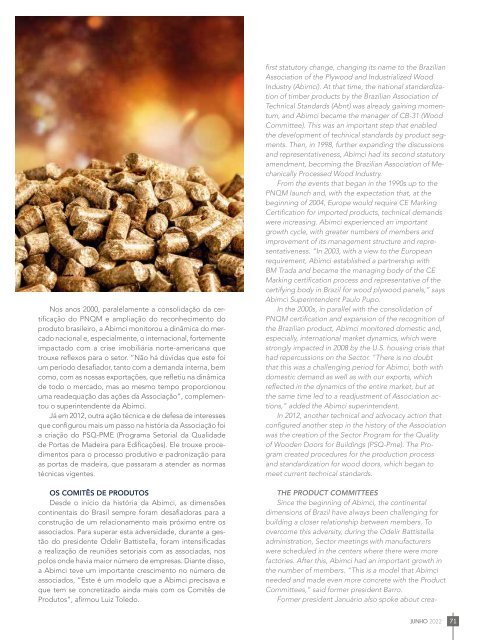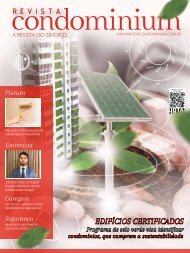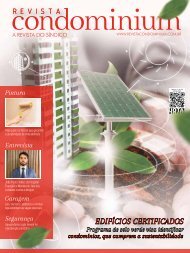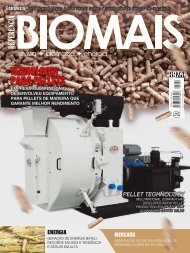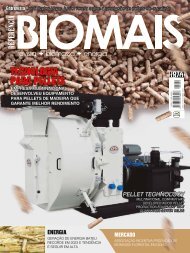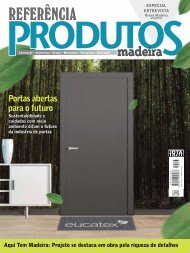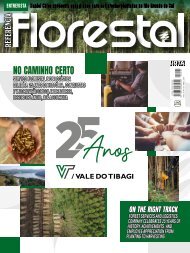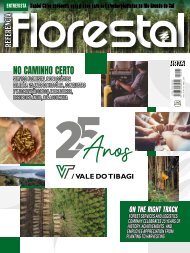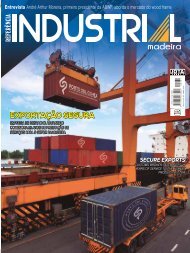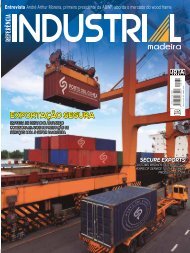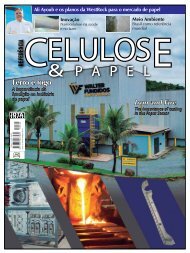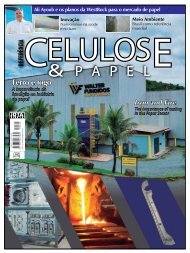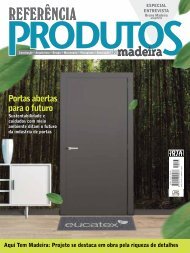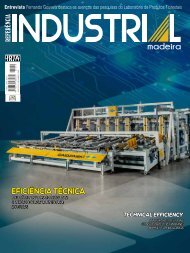You also want an ePaper? Increase the reach of your titles
YUMPU automatically turns print PDFs into web optimized ePapers that Google loves.
Nos anos 2000, paralelamente a consolidação da certificação<br />
do PNQM e ampliação do reconhecimento do<br />
produto brasileiro, a Abimci monitorou a dinâmica do mercado<br />
nacional e, especialmente, o internacional, fortemente<br />
impactado com a crise imobiliária norte-americana que<br />
trouxe reflexos para o setor. “Não há dúvidas que este foi<br />
um período desafiador, tanto com a demanda interna, bem<br />
como, com as nossas exportações, que refletiu na dinâmica<br />
de todo o mercado, mas ao mesmo tempo proporcionou<br />
uma readequação das ações da Associação”, complementou<br />
o superintendente da Abimci.<br />
Já em 2012, outra ação técnica e de defesa de interesses<br />
que configurou mais um passo na história da Associação foi<br />
a criação do PSQ-PME (Programa Setorial da Qualidade<br />
de Portas de Madeira para Edificações). Ele trouxe procedimentos<br />
para o processo produtivo e padronização para<br />
as portas de madeira, que passaram a atender as normas<br />
técnicas vigentes.<br />
OS COMITÊS DE PRODUTOS<br />
Desde o início da história da Abimci, as dimensões<br />
continentais do Brasil sempre foram desafiadoras para a<br />
construção de um relacionamento mais próximo entre os<br />
associados. Para superar esta adversidade, durante a gestão<br />
do presidente Odelir Battistella, foram intensificadas<br />
a realização de reuniões setoriais com as associadas, nos<br />
polos onde havia maior número de empresas. Diante disso,<br />
a Abimci teve um importante crescimento no número de<br />
associados, “Este é um modelo que a Abimci precisava e<br />
que tem se concretizado ainda mais com os Comitês de<br />
Produtos”, afirmou Luiz Toledo.<br />
first statutory change, changing its name to the Brazilian<br />
Association of the Plywood and <strong>Industrial</strong>ized Wood<br />
Industry (Abimci). At that time, the national standardization<br />
of timber products by the Brazilian Association of<br />
Technical Standards (Abnt) was already gaining momentum,<br />
and Abimci became the manager of CB-31 (Wood<br />
Committee). This was an important step that enabled<br />
the development of technical standards by product segments.<br />
Then, in 1998, further expanding the discussions<br />
and representativeness, Abimci had its second statutory<br />
amendment, becoming the Brazilian Association of Mechanically<br />
Processed Wood Industry.<br />
From the events that began in the 1990s up to the<br />
PNQM launch and, with the expectation that, at the<br />
beginning of 2004, Europe would require CE Marking<br />
Certification for imported products, technical demands<br />
were increasing. Abimci experienced an important<br />
growth cycle, with greater numbers of members and<br />
improvement of its management structure and representativeness.<br />
“In 2003, with a view to the European<br />
requirement, Abimci established a partnership with<br />
BM Trada and became the managing body of the CE<br />
Marking certification process and representative of the<br />
certifying body in Brazil for wood plywood panels,” says<br />
Abimci Superintendent Paulo Pupo.<br />
In the 2000s, in parallel with the consolidation of<br />
PNQM certification and expansion of the recognition of<br />
the Brazilian product, Abimci monitored domestic and,<br />
especially, international market dynamics, which were<br />
strongly impacted in 2008 by the U.S. housing crisis that<br />
had repercussions on the Sector. “There is no doubt<br />
that this was a challenging period for Abimci, both with<br />
domestic demand as well as with our exports, which<br />
reflected in the dynamics of the entire market, but at<br />
the same time led to a readjustment of Association actions,”<br />
added the Abimci superintendent.<br />
In 2012, another technical and advocacy action that<br />
configured another step in the history of the Association<br />
was the creation of the Sector Program for the Quality<br />
of Wooden Doors for Buildings (PSQ-Pme). The Program<br />
created procedures for the production process<br />
and standardization for wood doors, which began to<br />
meet current technical standards.<br />
THE PRODUCT COMMITTEES<br />
Since the beginning of Abimci, the continental<br />
dimensions of Brazil have always been challenging for<br />
building a closer relationship between members. To<br />
overcome this adversity, during the Odelir Battistella<br />
administration, Sector meetings with manufacturers<br />
were scheduled in the centers where there were more<br />
factories. After this, Abimci had an important growth in<br />
the number of members. “This is a model that Abimci<br />
needed and made even more concrete with the Product<br />
Committees,” said former president Barro.<br />
Former president Januário also spoke about crea-<br />
JUNHO 2022 71


